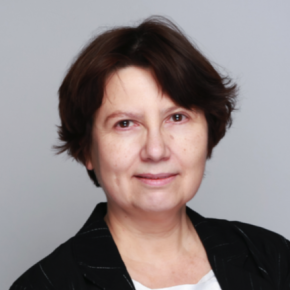An interview of Catherine Goldstein, plenary speaker at ICM2018
A senior researcher at the CNRS, Catherine Goldstein was invited as a plenary speaker at the 2018 International Congress of Mathematicians in Rio de Janeiro. She answered our questions.
What is your research domain?
My research domain is the history of mathematics. Practically, I deal with the way mathematics changed over time, how such changes are connected to those of other disciplines (one always thinks of physics but I am actually more interested in language sciences or natural history) or sometimes to cultural or political events (1st World War for instance). I've worked a lot on ways of capturing collective effects in a discipline where creation is still often perceived as strictly individual - meaning that I work at bringing back to light forgotten fascinating works and people and at understanding how concepts, traces of collaborations, stories, how to think the problem one has to solve, the very notion of solution, get intertwined in a text. I'm also fascinated with the way mathematicians construct what looks like concepts or results that prove stable on the long run through a process of identification, of adaptation, of rewriting which is often very tough, and it's up to us to unravel that process.
Could you tell us about mathematicians who were important to you?
There is Michèle Vergne, whose frank and deep narrative of her early stages (see "Mathematics and mathematicians" in the proceedings of P.Samuel's seminar) I read when I was young, and which struck me and encouraged me through her analytical insight, and her particular way of combining distance and commitment.
And then there is Jean-Pierre Serre. It's obvious if not commonplace for many mathematicians to say so, but as far as I am concerned, I believe I owe him to be a maniac of typography ("Never start a sentence with a symbol") or to rewrite my abstracts over and over. A very desperate requirement as a matter of fact, as I know that if by any chance he read me, he'd find errors, and he'd be right. More generally, I'm impressed by very rigourous people who make you wonder about yourself, a long way from your or their research domain: each time I listen to a talk by Claire Voisin, I feel convinced I'd better start again once or twice if not three times what I'm doing.
In the same way, I was very impressed by the historian Robert Descimon, whose seminar I followed at the EHESS for a couple of years, for the extraordinary knowledge he has of his sources, down to the tiniest details, serving a deep general, theoretical vision of the Society of the Ancien Régime.
The brilliant, kind, passionate and so different female mathematicians I met at Femmes & mathématiques also influenced me a lot. I think of Marie-Françoise Roy, Françoise Delon and Michèle Audin, but there would be so many others to mention.
In my own domain, the people who influenced me most are Jim Ritter and Norbert Schappacher, with whom I've had a conversation of over 30 years on the theory of the history of mathematics - a couple of common articles stemmed out it !
Finally, the mathematician with whom I certainly spent the more time with and which I know the more intimately (although the reverse is not true...) is no doubt Charles Hermite: I've read thousands of his letters and studied most of his articles, we hold opposite positions on many society subjects, and his maths are totally disconcerting, discursive and calculatory in all, going from one theme to another. In a word, fascinating.
What is it you like in your job as a mathematician?
The freedom, the variety of legitimate things to do, friendship and travels. Maths in so many different forms.
Do you already know what you're going to talk about in Rio?
... All that I said above! The real question is how to talk about it in just an hour. From my experience, giving a talk on the history of maths is the opportunity to raise a hundred of misunderstandings.
Catherine Goldstein is a CNRS Senior Researcher. She is a member of the Institut de mathématiques de Jussieu - Paris rive gauche (IMJ-PRG), a French maths lab jointly run by CNRS, Sorbonne Université & Université Paris Diderot.
